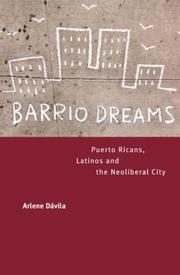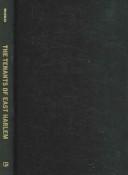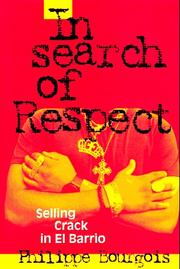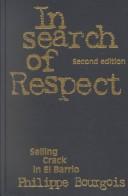| Listing 1 - 4 of 4 |
Sort by
|

ISBN: 9786612763014 1597344796 1282763016 0520937724 9780520937727 0520240928 9780520240926 0520240936 9780520240933 6612763019 9781597344791 9781282763012 Year: 2004 Publisher: Berkeley University of California Press
Abstract | Keywords | Export | Availability | Bookmark
 Loading...
Loading...Choose an application
- Reference Manager
- EndNote
- RefWorks (Direct export to RefWorks)
Arlene Dávila brilliantly considers the cultural politics of urban space in this lively exploration of Puerto Rican and Latino experience in New York, the global center of culture and consumption, where Latinos are now the biggest minority group. Analyzing the simultaneous gentrification and Latinization of what is known as El Barrio or Spanish Harlem, Barrio Dreams makes a compelling case that-despite neoliberalism's race-and ethnicity-free tenets-dreams of economic empowerment are never devoid of distinct racial and ethnic considerations. Dávila scrutinizes dramatic shifts in housing, the growth of charter schools, and the enactment of Empowerment Zone legislation that promises upward mobility and empowerment while shutting out many longtime residents. Foregrounding privatization and consumption, she offers an innovative look at the marketing of Latino space. She emphasizes class among Latinos while touching on black-Latino and Mexican-Puerto Rican relations. Providing a unique multifaceted view of the place of Latinos in the changing urban landscape, Barrio Dreams is one of the most nuanced and original examinations of the complex social and economic forces shaping our cities today.
Gentrification --- Puerto Ricans --- Latin Americans --- Housing policy --- Enterprise zones --- Latinxs --- Ethnology --- Urban renewal --- Empowerment zones --- Enterprise zones, Urban --- Urban enterprise zones --- Zones, Enterprise --- Zones, Urban enterprise --- Business enterprises --- Community development, Urban --- Industrial promotion --- Manpower policy --- Tax credits --- Housing --- Taxation --- East Harlem (New York, N.Y.) --- Social conditions. --- Economic conditions. --- Politics and government. --- Barrio (New York, N.Y.) --- El Barrio (New York, N.Y.) --- Spanish Harlem (New York, N.Y.) --- Boricuas --- american culture. --- american legislation. --- charter schools. --- class differences. --- consumption. --- cultural politics. --- demographic studies. --- economic empowerment. --- el barrio. --- ethnic issues. --- gentrification. --- globalization. --- housing crises. --- immigrant experience. --- interethnic relations. --- largest minority group. --- latinization. --- latinos. --- neoliberals. --- new york. --- nonfiction. --- puerto ricans. --- racial issues. --- sociology. --- spanish harlem. --- textbooks. --- urban landscape. --- urban space.

ISBN: 1282772058 9786612772054 0520939549 160129526X 9780520939547 1429413794 9781429413794 9781601295262 0520244273 0520247477 9780520244276 9780520247475 9781282772052 6612772050 Year: 2006 Publisher: Berkeley University of California Press
Abstract | Keywords | Export | Availability | Bookmark
 Loading...
Loading...Choose an application
- Reference Manager
- EndNote
- RefWorks (Direct export to RefWorks)
Rich with the textures and rhythms of street life, The Tenants of East Harlem is an absorbing and unconventional biography of a neighborhood told through the life stories of seven residents whose experiences there span nearly a century. Modeled on the ethnic distinctions that divide the community, the book portrays the old guard of East Harlem: Pete, one of the last Italian holdouts; José, a Puerto Rican; and Lucille, an African American. Side by side with these representatives of a century of ethnic succession are the newcomers: Maria, an undocumented Mexican; Mohamed, a West African entrepreneur; Si Zhi, a Chinese immigrant and landlord; and, finally, the author himself, a reluctant beneficiary of urban renewal. Russell Leigh Sharman deftly weaves these oral histories together with fine-grained ethnographic observations and urban history to examine the ways that immigration, housing, ethnic change, gentrification, race, class, and gender have affected the neighborhood over time. Providing unique access to the nuances of inner-city life, The Tenants of East Harlem shows how roots sink so quickly in a community that has always hosted the transient, how new immigrants are challenging the claims of the old, and how that cycle is threatened as never before by the specter of gentrification.
Sociology, Urban --- Urban anthropology --- Ethnicity --- Community development, Urban --- Gentrification --- Urban renewal --- Community programs, Urban --- Neighborhood improvement programs --- Urban community development --- Urban economic development --- City planning --- Urban policy --- Ethnic identity --- Group identity --- Cultural fusion --- Multiculturalism --- Cultural pluralism --- Anthropology, Urban --- Ethnology --- Urban sociology --- Cities and towns --- Citizen participation --- Government policy --- Social aspects --- East Harlem (New York, N.Y.) --- Social conditions. --- Economic conditions. --- Social life and customs. --- Barrio (New York, N.Y.) --- El Barrio (New York, N.Y.) --- Spanish Harlem (New York, N.Y.) --- african americans. --- america. --- anthropologists. --- anthropology. --- chinese americans. --- class differences. --- east harlem. --- ethnic differences. --- gender studies. --- gentrification. --- harlem residents. --- housing. --- immigrant experiences. --- inner city life. --- italian americans. --- new york. --- nonfiction biography. --- oral histories. --- personal stories. --- puerto ricans. --- race issues. --- sociology. --- street life. --- transient living. --- undocumented mexicans. --- united states. --- urban history. --- urban life. --- west africa.

ISBN: 0521435188 9780521435185 Year: 1995 Publisher: Cambridge Cambridge University press
Abstract | Keywords | Export | Availability | Bookmark
 Loading...
Loading...Choose an application
- Reference Manager
- EndNote
- RefWorks (Direct export to RefWorks)
Social problems --- New York City --- Informal sector (Economics) --- -Hispanic Americans --- -Marginality, Social --- -Afro-Americans --- -Crack (Drug) --- -Drug trafficking --- -Social conditions --- Drug use --- -East Harlem (New York, N.Y.) --- -Economic conditions --- Social conditions --- Crack (Drug) --- -Drug traffic --- -African Americans --- -Informal sector (Economics) --- -Hidden economy --- Parallel economy --- Second economy --- Shadow economy --- Subterranean economy --- Underground economy --- Artisans --- Economics --- Small business --- Hispanic Americans --- Hispanics (United States) --- Latino Americans --- Latinos (United States) --- Spanish Americans in the United States --- Spanish-speaking people (United States) --- Spanish-surnamed people (United States) --- Ethnology --- Latin Americans --- Spanish Americans (Latin America) --- African Americans --- Afro-Americans --- Black Americans --- Colored people (United States) --- Negroes --- Africans --- Blacks --- Drug dealing --- Drug production, Illicit --- Drug smuggling --- Drug trade, Illicit --- Drug trafficking --- Drugs --- Illicit drug production --- Illicit drug trade --- Narcotic trade --- Narcotic traffic --- Narcotic trafficking --- Smuggling of drugs --- Smuggling of narcotics --- Traffic, Drug --- Trafficking in drugs --- Trafficking in narcotics --- Drug abuse and crime --- Narco-terrorism --- Exclusion, Social --- Marginal peoples --- Social exclusion --- Social marginality --- Assimilation (Sociology) --- Culture conflict --- Social isolation --- Sociology --- People with social disabilities --- Crack cocaine --- Cocaine --- -Drug use --- -Prices and sale --- East Harlem (New York, N.Y.) --- Drug traffic --- Marginality, Social --- Social conditions. --- Hidden economy --- Prices and sale --- Economic conditions. --- New York (State) --- Marginality [Social ] --- Economic conditions --- Drug trafficking - New York (State) - East Harlem (New York) --- Afro-Americans - Drug use - New York (State) - East Harlem (New York) --- Afro-Americans - New York (State) - East Harlem (New York) - Social conditions. --- Hispanic Americans - Drug use - New York (State) - East Harlem (New York) --- Hispanic Americans - New York (State) - East Harlem (New York) - Social conditions. --- Informal sector (Economics) - New York (State) - East Harlem (New York) --- Marginality, Social - New York (State) - East Harlem (New York) --- East Harlem (New York, N.Y.) - Economic conditions. --- Latinxs --- Black people --- Barrio (New York, N.Y.) --- El Barrio (New York, N.Y.) --- Spanish Harlem (New York, N.Y.) --- Informal sector (Economics) - East Harlem (New York) - New York (State) --- Hispanic Americans - Social conditions - New York (State) - East Harlem (New York) --- Marginality, Social - East Harlem (New York) - New York (State) --- Afro-Americans - Drug use - East Harlem (New York) - New York (State) --- Crack (Drug) - East Harlem (New York) - New York (State) --- Drug trafficking - East Harlem (New York) - New York (State) --- Afro-Americans - Social conditions - New York (State) - - East Harlem (New York) --- Hispanic Americans - Drug use - East Harlem (New York) - New York (State) --- East Harlem (New York, N.Y.) - Economic conditions --- East Harlem (New York, N.Y.) - Social conditions --- New York City [New York]

ISBN: 0521815622 0521017114 0511808569 1107264014 Year: 2003 Publisher: Cambridge : Cambridge University Press,
Abstract | Keywords | Export | Availability | Bookmark
 Loading...
Loading...Choose an application
- Reference Manager
- EndNote
- RefWorks (Direct export to RefWorks)
In Search of Respect, Philippe Bourgois's now-classic, ethnographic study of social marginalization in inner-city America, won critical acclaim after it was first published in 1995 and in 1997 was awarded the Margaret Mead Award. For the first time, an anthropologist had managed to gain the trust and long-term friendship of street-level drug dealers in one of the roughest ghetto neighborhoods in the United States - East Harlem. This edition adds a prologue describing the major dynamics in America that have altered life on the streets of East Harlem in the six years since the first edition. Bourgois, in a new epilogue, brings up to date the stories of the people - Primo, Caesar, Luis, Tony, Candy - who readers come to know in this remarkable window onto the world of the inner-city drug trade.
Crack (Drug) --- Drug traffic --- Hispanic Americans --- African Americans --- Informal sector (Economics) --- Marginality, Social --- Crack (Drogue) --- Drogues --- Américains d'origine latino-américaine --- Noirs américains --- Secteur informel (Economie politique) --- Exclusion sociale --- Drug use --- Social conditions. --- Trafic --- Usage des drogues --- Conditions sociales --- East Harlem (New York, N.Y.) --- Economic conditions. --- Conditions économiques --- Exclusion, Social --- Marginal peoples --- Social exclusion --- Social marginality --- Assimilation (Sociology) --- Culture conflict --- Social isolation --- Sociology --- People with social disabilities --- Hidden economy --- Parallel economy --- Second economy --- Shadow economy --- Subterranean economy --- Underground economy --- Artisans --- Economics --- Small business --- Afro-Americans --- Black Americans --- Colored people (United States) --- Negroes --- Africans --- Ethnology --- Black people --- Hispanics (United States) --- Latino Americans --- Latinos (United States) --- Latinxs --- Spanish Americans in the United States --- Spanish-speaking people (United States) --- Spanish-surnamed people (United States) --- Latin Americans --- Spanish Americans (Latin America) --- Drug dealing --- Drug production, Illicit --- Drug smuggling --- Drug trade, Illicit --- Drug trafficking --- Drugs --- Illicit drug production --- Illicit drug trade --- Narcotic trade --- Narcotic traffic --- Narcotic trafficking --- Smuggling of drugs --- Smuggling of narcotics --- Traffic, Drug --- Trafficking in drugs --- Trafficking in narcotics --- Drug abuse and crime --- Narco-terrorism --- Crack cocaine --- Cocaine --- Prices and sale --- New York (N.Y.) --- New York (City) --- Ni︠u︡ Ĭork (N.Y.) --- Novi Jork (N.Y.) --- Nova Iorque (N.Y.) --- Nyu-Yorḳ (N.Y.) --- Nueva York (N.Y.) --- Nu Yorḳ (N.Y.) --- Nyuyok (N.Y.) --- Nuyorḳ (N.Y.) --- New York City (N.Y.) --- Niyū Yūrk (N.Y.) --- Niyūyūrk (N.Y.) --- Niu-yüeh (N.Y.) --- Nowy Jork (N.Y.) --- City of New York (N.Y.) --- New York Stad (N.Y.) --- نيويورك (N.Y.) --- Táva Nueva York (N.Y.) --- Nyu-York Şähäri (N.Y.) --- Нью-Йорк (N.Y.) --- Горад Нью-Ёрк (N.Y.) --- Horad Nʹi︠u︡-I︠O︡rk (N.Y.) --- Нью-Ёрк (N.Y.) --- Ню Йорк (N.Y.) --- Nova York (N.Y.) --- Çĕнĕ Йорк (N.Y.) --- Śĕnĕ Ĭork (N.Y.) --- Dakbayan sa New York (N.Y.) --- Dinas Efrog Newydd (N.Y.) --- Efrog Newydd (N.Y.) --- Nei Yarrick Schtadt (N.Y.) --- Nei Yarrick (N.Y.) --- Νέα Υόρκη (N.Y.) --- Nea Yorkē (N.Y.) --- Ciudad de Nueva York (N.Y.) --- Novjorko (N.Y.) --- Nouvelle York (N.Y.) --- Nua-Eabhrac (N.Y.) --- Cathair Nua-Eabhrac (N.Y.) --- Caayr York Noa (N.Y.) --- York Noa (N.Y.) --- Eabhraig Nuadh (N.Y.) --- Baile Eabhraig Nuadh (N.Y.) --- Нью Йорк балhсн (N.Y.) --- Nʹi︠u︡ Ĭork balḣsn (N.Y.) --- Шин Йорк (N.Y.) --- Shin Ĭork (N.Y.) --- 뉴욕 (N.Y.) --- Lungsod ng New York (N.Y.) --- Tchiaq York Iniqpak (N.Y.) --- Tchiaq York (N.Y.) --- New York-borg (N.Y.) --- Nuova York (N.Y.) --- ניו יורק (N.Y.) --- New York Lakanbalen (N.Y.) --- Lakanabalen ning New York (N.Y.) --- Evrek Nowydh (N.Y.) --- Nouyòk (N.Y.) --- Bajarê New Yorkê (N.Y.) --- New Yorkê (N.Y.) --- Mueva York (N.Y.) --- Sivdad de Mueva York (N.Y.) --- סיבֿדאד די מואיבֿה יורק (N.Y.) --- Sivdad de Muevah Yorḳ (N.Y.) --- מואיבֿה יורק (N.Y.) --- Muevah Yorḳ (N.Y.) --- Novum Eboracum (N.Y.) --- Neo-Eboracum (N.Y.) --- Civitas Novi Eboraci (N.Y.) --- Ņujorka (N.Y.) --- Niujorkas (N.Y.) --- Niujorko miestas (N.Y.) --- Niuiork (N.Y.) --- Њујорк (N.Y.) --- Njujork (N.Y.) --- Bandar Raya New York (N.Y.) --- Bandaraya New York (N.Y.) --- Nuoba Iorque (N.Y.) --- Нью-Йорк хот (N.Y.) --- Nʹi︠u︡-Ĭork khot (N.Y.) --- Āltepētl Yancuīc York (N.Y.) --- Niej-York (N.Y.) --- ニューヨーク (N.Y.) --- Nyū Yōku (N.Y.) --- ニューヨーク市 (N.Y.) --- Nyū Yōku-shi (N.Y.) --- NYC (N.Y.) --- N.Y.C. (N.Y.) --- Barrio (New York, N.Y.) --- El Barrio (New York, N.Y.) --- Spanish Harlem (New York, N.Y.)
| Listing 1 - 4 of 4 |
Sort by
|

 Search
Search Feedback
Feedback About UniCat
About UniCat  Help
Help News
News